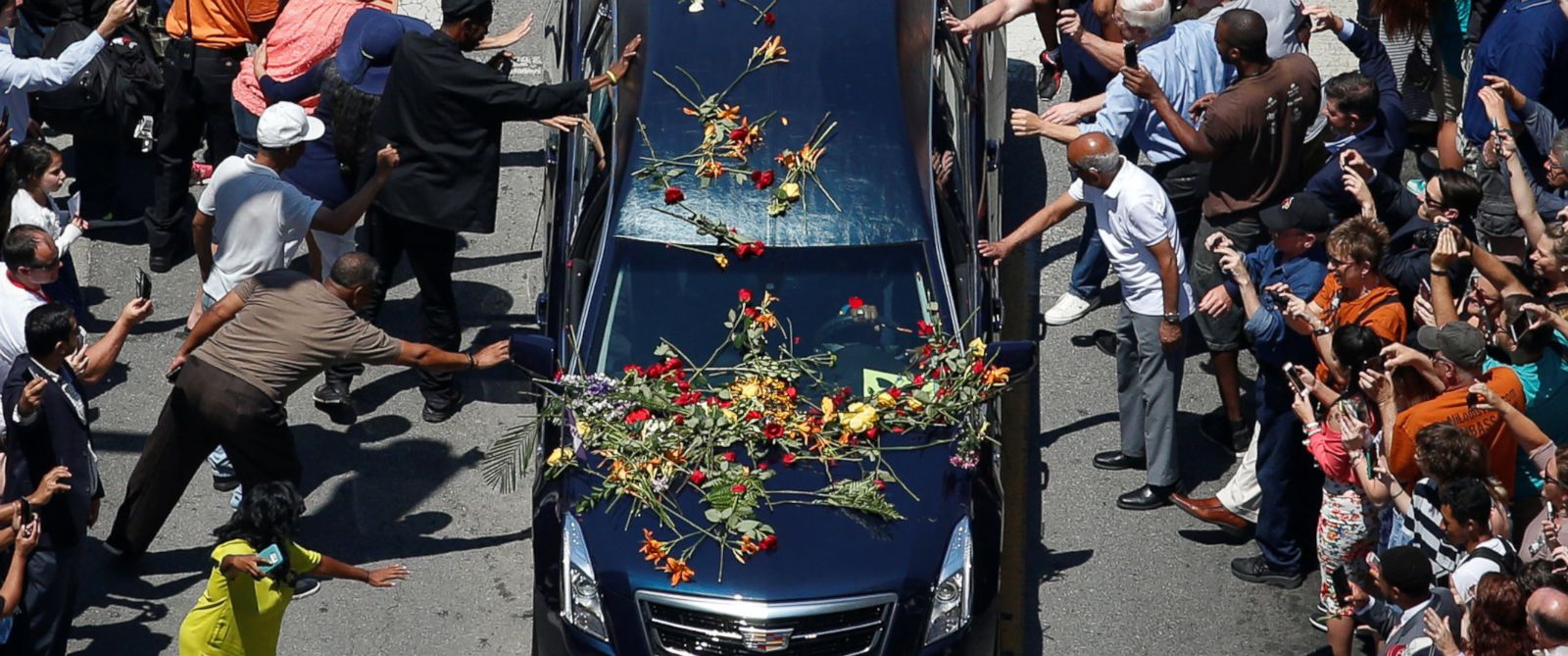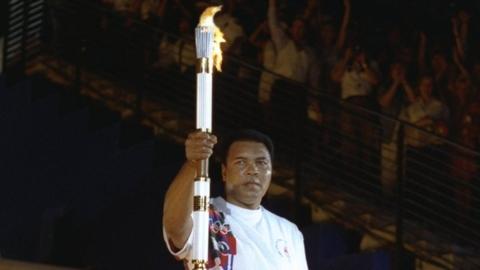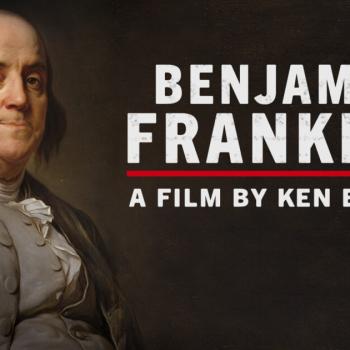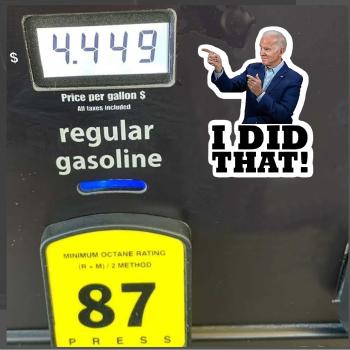
I spent a lot of time watching the non-stop coverage of the funeral of Muhammad Ali today. There was no mistaking the feeling that I was watching history being made. Some of the images from today’s 19 mile funeral procession through the streets of Louisville will, no doubt, take a place in the historic media pantheon of imagery that will be seen by future generation upon future generation, like the iconic images of the Kennedy funeral procession with little John John stepping out to salute his fallen father. It was chill-inducing stuff watching the hearse pass through the throngs of adorers lining the streets of the Derby City, many chanting, “Ali…Ali…Ali”, many placing flowers on or near the hearse as it passed, many striding up along side the slowly rolling limo to simply touch it gently. It is estimated that 100,000 gathered to watch the procession. It seemed like more.

I was always fascinated with Ali. Never a big fan of boxing, I, nonetheless, watched Ali’s fights as a child. It seemed everyone did back then. Ali fights were more than boxing matches, they were human theater. I’m a little too young to have seen Ali fight in his prime years. By the time I was old enough to understand what was going on, the Greatest was on the decline. But I knew, even then, that there was something different about this man. In recent years, I have spent a lot of time watching Ali in his prime via documentaries and Youtube clips. He was a different kind of heavyweight to be sure, not the biggest or most powerful but, in his prime, he was the quickest and, always, he was the smartest fighter in the ring. But I’m not here to write about Ali the boxer. I am much more interested in Ali the human being.
It seems incredible to me that, in today’s socio-political climate, the whole world appears to be showing such love for Ali. For the last half century, he has been one of (if not THE) most famous people in the world, at times very polarizing, beloved by millions and criticized by millions. But late in life, stricken by Parkinson’s Disease and severely physically diminished to the point where the once highly verbose and braggadocious champ had lost the power of speech, Ali seemed to gain a level of universal respect that seems logically unattainable in today’s world. This is fascinating to me because it is so enigmatic. We are talking about a man who sided with the ultra-controversial Malcolm X during the Civil Rights movement, converted to Islam and changed his name from Cassius Clay, then refused to fight in Viet Nam. We are talking about a man who was a shameless self-promoter, proclaiming loudly to anyone who would listen that he was “the greatest of all times.” There is plenty there that turned a lot of people off of Muhammad Ali, so how is it that the whole world stopped for a whole day to watch his funeral?
Ali’s status as universally beloved came about through a process of circumstances that amount to the perfect storm. Ali was, at once, created by his times and a shaper of his times.
- He was a black boxer who arrived on the scene right at the peak of the volatile 60’s Civil Rights Era. He took the opposite approach of previous soft-spoken, meek black heavyweight champions such as Jack Johnson and Joe Lewis. The time was ripe for a new kind of bold and outspoken champion and Ali stepped into that role with reckless abandon. We live in times where professional athletes, black and white, have no trouble promoting themselves. For black athletes, that basically was started by Ali (some credit should be given to others like Jackie Robinson of course, but Ali took it to new heights). Young black men suddenly saw that it was ok to be bold and proud. That was an important step in a time when blacks across the nation were forced to make a major push for equality they were supposed to have been granted a hundred years prior.
- As he rose through the ranks, a very unlikely bond began to form between he and the most important sportscaster of this time, the very white and very Jewish Howard Cosell. This extremely odd couple found each other at just the right time. Cosell needed Ali and Ali needed Cosell. They fed off each other and whenever they appeared together it was must see tv. It was the perfect partnership and became the vehicle to drive the Ali story right where it needed to go most, into the living rooms of white, middle class America. It was through his relationship with Cosell that the world began to see that, behind those boastful rantings, there was a kind and warm twinkle in the eye of the champ. There was always a playfulness behind Ali’s eyes that belied the aggressive message that he was spewing. Those who took the time to notice understood that Ali had a kind and gentle spirit. Underneath the rough, loud exterior beat the heart of a teddybear.
- Ali converted to Islam at a time when many young black men were feeling let down by their Christian churches. Born and raised a Baptist, Ali saw the hypocrisy that seemed embedded in the more conservative aspects of the traditional churches of the time when it came to racial equity. When he changed his name to Ali, he famously said that he no longer wanted to carry the name of his slave owner. A lightly veiled jab at that hypocrisy, no doubt.
- Ali took a stand against the Viet Nam War by refusing to participate, saying he had no quarrel with the Viet Cong. In doing so, he was stripped of his boxing license and lost over three years of the very prime of his career. Ali took this stand early in the going, before it became the “in thing” to do, and he paid dearly for it, both monetarily and in reputation. Even today, the place you will find the least love for Ali is among military veterans, which is, of course, understandable.
- By the time he got back into his career, Ali had become THE black face for the world. This was so apparent when he arrived in Zaire for the “Rumble in the Jungle” against George Foreman in 1974. The African people embraced Ali in a way that is still astounding to ponder. Riding that support, Ali, far less physically gifted than before his hiatus, of course, went on to defy all the odds and defeated Foreman to regain the heavyweight championship belt and added exponentially to his boxing legacy.
- The tragedy of Ali is that his retirement became almost immediately marred by his illness. He was first diagnosed with Parkinson’s in 1984, just 3 years after he officially retired from boxing, but he clearly showed signs of the disease long before the diagnosis. His battle against this terrible ailment added to his mystique. He didn’t let the disease stop him from living life to the fullest. He also didn’t let it stop him from making a big impact on the world.
- In 1996 Ali, who by this time had become severely affected by the ravages of his disease, was selected to light the Olympic torch at the opening ceremony of the games in Atlanta. The iconic images of the frail champ standing on the platform before a full stadium and untold millions of television viewers across the world, vulnerable, shaking uncontrollably, yet stoic and proud, is the single most enduring moment from those games.

- Another enduring image of Ali’s later years was the impassioned pleas he made for peace following the 9/11 attacks. Struggling to steady himself and to speak clearly, due to his advancing illness, Ali rallied to address the nation and beseeched us to keep in mind that the terrorists who carried out those horrible acts were not true followers of Islam. He insisted, as always, that his religion was one of peace and tolerance.
When it comes down to it, that was Ali’s greatest gift. He had the ability to bring people together, regardless of race or religion. That was so apparent today watching his incredible memorial service in Louisville. There was a strong Islamic element, but there was also a very powerful Christian message delivered by a local preacher. There were people of all stripes and backgrounds there in the arena for that service, lining the streets of Louisville, and watching, like me, from the comfort of their homes in middle class, racially and culturally diverse America and around the world. For one final time, the Greatest brought us all together and challenged us to ponder why we can’t be like this more often.
Rest in Peace, Muhammad.











